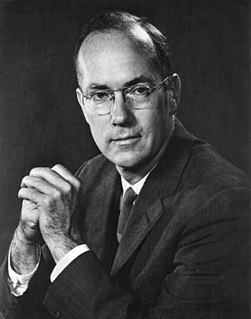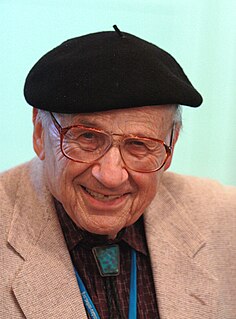Related Research Articles

Charles Hard Townes was an American physicist. Townes worked on the theory and application of the maser, for which he obtained the fundamental patent, and other work in quantum electronics associated with both maser and laser devices. He shared the 1964 Nobel Prize in Physics with Nikolay Basov and Alexander Prokhorov. Townes was an adviser to the United States Government, meeting every US President from Harry Truman (1945) to Bill Clinton (1999).

Walter Kohn was an Austrian-American theoretical physicist and theoretical chemist. He was awarded, with John Pople, the Nobel Prize in Chemistry in 1998. The award recognized their contributions to the understandings of the electronic properties of materials. In particular, Kohn played the leading role in the development of density functional theory, which made it possible to calculate quantum mechanical electronic structure by equations involving the electronic density. This computational simplification led to more accurate calculations on complex systems as well as many new insights, and it has become an essential tool for materials science, condensed-phase physics, and the chemical physics of atoms and molecules.

Leo Philip Kadanoff was an American physicist. He was a professor of physics at the University of Chicago and a former President of the American Physical Society (APS). He contributed to the fields of statistical physics, chaos theory, and theoretical condensed matter physics.

Henry Frederick "Fritz" Schaefer III is a computational and theoretical chemist. He is one of the most highly cited chemists in the world, with a Thomson Reuters H-Index of 121 as of 2020. He is the Graham Perdue Professor of Chemistry and Director of the Center for Computational Chemistry at the University of Georgia.

Ferenc Krausz is a Hungarian-Austrian physicist, whose research team has generated and measured the first attosecond light pulse and used it for capturing electrons’ motion inside atoms, marking the birth of attophysics.
John Ross was a scientist in physical chemistry and the Camille and Henry Dreyfus Professor of Chemistry at Stanford University.

Peter Zoller is a theoretical physicist from Austria. He is Professor at the University of Innsbruck and works on quantum optics and quantum information and is best known for his pioneering research on quantum computing and quantum communication and for bridging quantum optics and solid state physics.

Juan Ignacio Cirac Sasturain, known professionally as Ignacio Cirac, is a Spanish physicist. He is one of the pioneers of the field of quantum computing and quantum information theory. He is the recipient of the 2006 Prince of Asturias Award in technical and scientific research.

Nader Engheta is an Iranian-American scientist. He has made pioneering contributions to the fields of metamaterials, transformation optics, plasmonic optics, nanophotonics, graphene photonics, nano-materials, nanoscale optics, nano-antennas and miniaturized antennas, physics and reverse-engineering of polarization vision in nature, bio-inspired optical imaging, fractional paradigm in electrodynamics, and electromagnetics and microwaves.
Harry Eugene Stanley is an American physicist and University Professor at Boston University. He has made seminal contributions to statistical physics and is one of the pioneers of interdisciplinary science. His current research focuses on understanding the anomalous behavior of liquid water, but he had made fundamental contributions to complex systems, such as quantifying correlations among the constituents of the Alzheimer brain, and quantifying fluctuations in noncoding and coding DNA sequences, interbeat intervals of the healthy and diseased heart. He is one of the founding fathers of econophysics.

David Jeffrey Wineland is an American Nobel-laureate physicist at the National Institute of Standards and Technology (NIST) physics laboratory. His work has included advances in optics, specifically laser-cooling trapped ions and using ions for quantum-computing operations. He was awarded the 2012 Nobel Prize in Physics, jointly with Serge Haroche, for "ground-breaking experimental methods that enable measuring and manipulation of individual quantum systems".
Knut W. Urban is a German physicist. He has been the Director of the Institute of Microstructure Research at Forschungszentrum Jülich from 1987 to 2010.
H. Jeff Kimble, is the William L. Valentine Professor and Professor of Physics at Caltech. His research is in quantum optics and is noted for groundbreaking experiments in physics including one of the first demonstrations of teleportation of a quantum state, quantum logic gate, and the development of the first single atom laser. According to Elizabeth Rogan, OSA CEO, "Jeff has led a revolution in modern physics through his pioneering research in the coherent control of the interactions of light and matter." Kimble's main research focus is in quantum information science and the quantum dynamics of open systems.
Bruce Winstein was an experimental physicist and cosmologist noted for his early work in elementary particle physics, particularly work toward demonstrating a serious asymmetry between particles and their anti-particles. Later in his career, he worked in experimental cosmology, measuring polarization in the microwave background radiation whose properties date back to the early universe.
Ian Alexander Walmsley FRS is Provost of Imperial College London where he is also Chair of Experimental Physics. He was previously pro-vice-chancellor for research and Hooke Professor of Experimental Physics at the University of Oxford, and a professorial fellow at St Hugh's College, Oxford. He is also director of the NQIT hub within the UK National Quantum Technology Programme, which is led by the University of Oxford.
Walter Kutschera is an Austrian physicist.
Arindam Ghosh is an Indian experimental condensed matter physicist and a Professor in the Department of Physics, Indian Institute of Science, Bangalore, India. He was awarded the Shanti Swarup Bhatnagar Prize for science and technology, the highest science award in India, for the year 2012 in physical sciences category.
Dipankar Das Sarma, popularly known as D.D. Sarma, is an Indian scientist and structural chemist, known for his researches in the fields of Solid State Chemistry, Spectroscopy, Condensed Matter Physics, Materials Science, and Nanoscience. He is a former MLS Chair Professor of Physics and Chairman of the Centre for Advanced Materials and the GAST Professor of Uppsala University, Sweden, A recipient of TWAS Physics Prize and the UNESCO Biennial Javed Husain Prize, Sarma was honored by the Council for Scientific and Industrial Research (CSIR), Government of India, in 1994, with the Shanti Swarup Bhatnagar Prize for Science and Technology.
Hartmut Zohm is a German plasma physicist who is known for his work on the ASDEX Upgrade machine. He received the 2014 John Dawson Award and the 2016 Hannes Alfvén Prize for successfully demonstrating that neoclassical tearing modes in tokamaks can be stabilized by electron cyclotron resonance heating, which is an important design consideration for pushing the performance limit of the ITER.
Eugene John "Gene" Mele is a professor of physics at the University of Pennsylvania, where he researches quantum electric phenomena in condensed matter.
References
- 1 2 "Christian SPIELMANN". Femtolasers. Archived from the original on September 26, 2014. Retrieved January 3, 2014.
- ↑ Karl Riedling. "OePG - Awardees". Austrian Physical Society . Retrieved January 3, 2014.
- ↑ "Dr. Christian Spielmann, Friedrich-Schiller-Universitaet Jena". EurekAlert!. Retrieved December 9, 2013.
- ↑ Spielmann Receives Research Award, Photonics.com, April 5, 2011